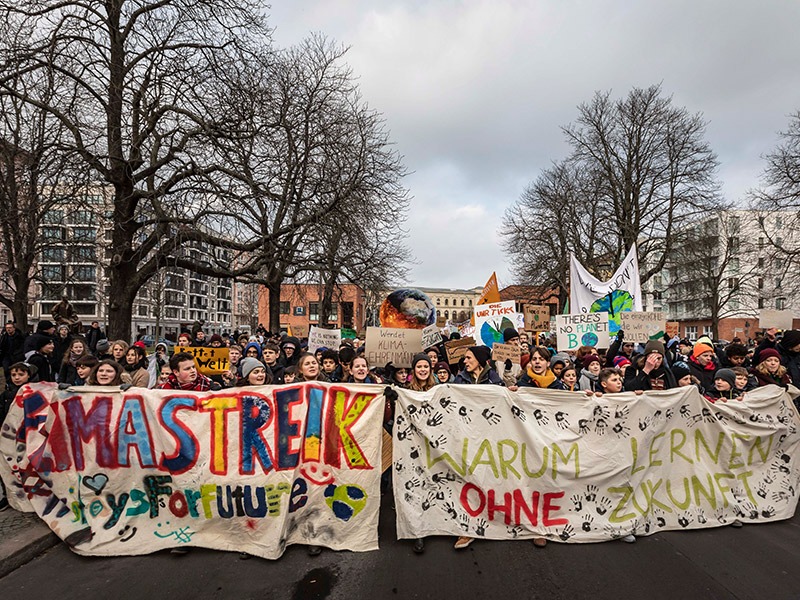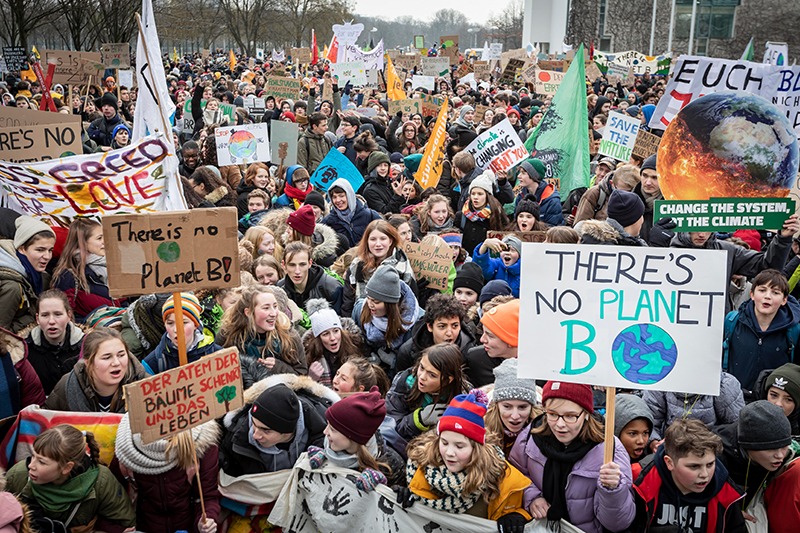Global climate strike – it´s time to get angry
- minutes reading time
On the 20th of September, Sympatex will join the climate strike as a company (#CompaniesForFuture)

Climate strike on September 20 – heading to the streets to join Fridays for Future
Imagine for a moment that your best friend is alcohol-dependent. What kind of advice would you give him? One proven option is certainly checking-in to a rehab clinic where he could wean himself from his addiction while under constant supervision. Another option, which calls for significantly more trust, is exercising self-control in his local bar. Here, during one round of drinks after another, he could discuss his intentions with the profit-oriented owner of the bar.
We’ve long known that apart from the support of people who act as a great source of strength, what it takes is discipline and an iron will. No one would ever think about looking for ways to take smaller, painless steps in order to spare an addict the rocky path to withdrawal. And we certainly wouldn’t try to justify his constantly-growing thirst as unavoidably imperative given the challenges of daily life.
Armed with all of this knowledge, this is nevertheless precisely what we are doing when it comes to the on-going issue of the climate. Instead of collectively joining the climate strike initiated by the FridaysForFuture movement, which is hitting the streets demanding that politicians radically change their mindset, we look for ways to protect the climate through the smallest possible steps, fully aware that the current measures being proposed will be far from sufficient.
We underestimate the self-healing powers of economic systems and overestimate the self-healing capabilities of nature
Fossil fuels were available at the outset of the industrial revolution, without doubt bestowing on us unprecedented convenience. As a society we have meanwhile become dependent to the point that we believe we can no longer do without them. And governments justify their hesitation to phase out fossil fuels by pointing to the potential disadvantages for the economy.

Despite record temperatures, rapidly-melting glaciers or tropical forests in flames, the core of the debate continues to revolve around to what extent we are imposing unreasonable demands on the economy. To what extent we are imposing unreasonable demands on our planet appears to play a secondary role, even in the year 2019.
In the process, we are not only overestimating the self-healing powers of nature. Just because nature has compensated centuries-long for a wide range of man-made intrusions, that doesn’t automatically mean that our climate will be able to offset the consequences of human actions in the future as well. Over the past 50 years alone, we have managed to double our per capita emissions and the number of people on the planet.
Even worse however is that we are massively underestimating the self-healing powers of the economy. Most of the fossil dinosaurs hide behind dramatic doomsday scenarios, loudly warning us of the ostensible economic slump that is expected to befall us. While they strive to prevent every attempt to check us into the fossil fuels rehab clinic, we completely overlook how often our economy has reinvented itself from the ground up.
Imposing costs on industry for the CO2 it generates would be more than morally justified. It would also merely be an additional parameter in popular economic equations. Of course one can’t exclude the possibility that historic brands or products will disappear from the market, but completely new industrial potential would certainly be created at the same time.
With the political reflex to protect established industries however, we’re risking an opportunity to take a leading technological role in this future without alternatives. Instead of changing our addictive behavior, protecting industry only delays the phase out of fossil fuels.
Our economic system is much more resilient that generally believed. The steam engine was replaced by electric trains, wire-based telephony by mobile phones and the camera industry by smart phones. Why shouldn’t society be able to cope with the transformation of our energy sources?
Sure, we’ve survived several recent economic crises with lots of bruises, but none of these crises came about as a result of technology changes. They resulted from a “bubble economy” driven by the stock markets. Whether the dot.com bust or the subprime loan fiasco, these slumps were merely the hangover after the artificially-created party bubble, whose inherent weaknesses we closed our eyes to for much too long.
We have no option but to force the economy into fossil fuels rehab – and every moment we wait simply makes the climate crisis worse
The real danger to the economy is not phasing out fossil fuels, rather it’s our illusion that we can somehow labor away as before and shut our eyes to the consequences of this ignorance. The longer we wait to act, the greater the tremors will be when the “carbon bubble” finally busts.
We have to stop letting the addicts frighten us with their fears when it comes to phasing out fossil fuels. Their only aim is to keep from being committed to rehab because they don’t want to admit that they are hooked.
Instead of politics bending to the demands of the fossil fuels industry, it’s high time that exactly the opposite occurs – and that the needs of future generations, which they should be representing, are put on the front burner. This includes no longer leaving climate protection up to the voluntary efforts of committed individuals, and instead making it a guiding light from which we have to retroactively plan for what has to be done today.
Even if a couple of indicators that point to a cooling-off of the economy fit nicely into the political calculations of a lot of people, phasing out fossil-based energy will lead neither to mass unemployment nor an economic crisis. On the contrary, brand new industries will crop up. There will be a few withdrawal symptoms during the transition phase. But you can’t deal with an addiction without taking radical steps.
The global climate strike – worldwide support for FridaysForFuture
With that said, it’s important that industry finally takes a stand and stops letting our politicians use it as an excuse to avoid making the hard decisions. The “decarbonization” of our economy is a blue ocean strategy for those who prepare early enough. And we don’t have to be concerned about future job opportunities, because it’s these companies who in several years will gladly attract the talent from the incurable climate change deniers who might no longer be in a position to take care of them when the day comes that draconian changes are suddenly unavoidable.
2019 is the year that the young people of the FridaysForFuture movement began to hit the streets en masse to protest against the policies of the small compromise when it comes to protecting our climate. Since then, large groups numbering thousands have been joining because for them, “future” and “climate” are not abstract terms. In Germany, for the first time since the era of the nuclear arms race and the peace movement, an entire generation is protesting in the streets in order to demonstrate against current policies. The older generation would do well to urgently remember that we have those demonstrations to thank for the fact that the Cold War didn’t end in a catastrophe, but instead in a phase of nuclear disarmament.
Click on the button to load the content from fridaysforfuture.de.
Map: Locations in Germany where demonstrations are planned for September 20, 2019. Source: FridaysForFuture. Quelle: Fridays For Future
On September 20, 2019, the German government will decide on the further actions it wants to take to protect the environment and the climate. On this important day, the entire Sympatex organization will officially join the FridaysForFuture movement and hit the streets to participate in the climate strike. As part of this effort we will also officially support „CompaniesForFuture“, a campaign initiated by the ecologically-aligned GLS Bank, among others.
It’s our hope that many other companies will join this global strike, so that the economy can no longer be misused as an excuse for a lack of action on the part of our governments.
It’s time to get angry and to throw our support behind the younger generation instead of defending our comfort zone, which we are financing by placing a debt on the future!

댓글 (0)
Write the first comment